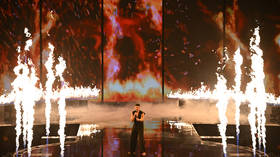Eurovision says no to Zelensky


The organizers of the Eurovision Song Contest have turned down Ukrainian President Vladimir Zelensky’s request to make a video address before the finals on Saturday. According to a statement quoted by British media, the European Broadcasting Union (EBU) does not wish to politicize the event.
The Ukrainian leader had hoped to address an audience estimated at 160 million and appeal for support in the conflict with Russia.
Zelensky’s request, “whilst made with laudable intentions, regrettably cannot be granted as it would be against the rules of the event,” the EBU said in a statement. They added that the contest is “governed by strict rules and principles which have been established since its creation,” one of the most important being the event’s “non-political nature.”
The EBU is an alliance of more than 100 broadcasters which runs the annual music competition. Traditionally, it is hosted by the country that wins the previous year’s contest. Ukraine’s Kalush Orchestra won the 2022 event in Italy, but Kiev could not take on hosting duties due to the conflict, so the event went to the UK as the second-place finisher.
The BBC and the EBU chose to “reflect and celebrate Ukraine’s Eurovision song contest win and show we are united by music during these hard times,” by introducing every participating artist with a “video postcard” featuring 37 locations from around the country.
Zelensky has asked to address numerous international events over the past year. The Oscars rejected him twice, reportedly saying it would make the awards inappropriately political.
The Toronto Film Festival in Canada turned him down in September last year. FIFA declined Zelensky's request to address the World Cup final in Qatar in December
“Too bad,” Russian Foreign Ministry spokeswoman Maria Zakharova said in response to the EBU decision. “He would have made worthy competition to Eurovision participants this year.” This was likely a reference to Zelensky’s prior career as a comedian, sometimes dressing in drag and on one occasion, pretending to play the piano with his private parts.